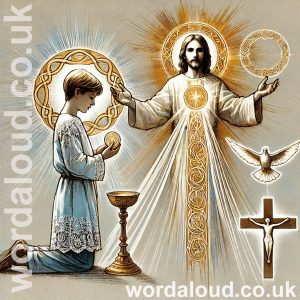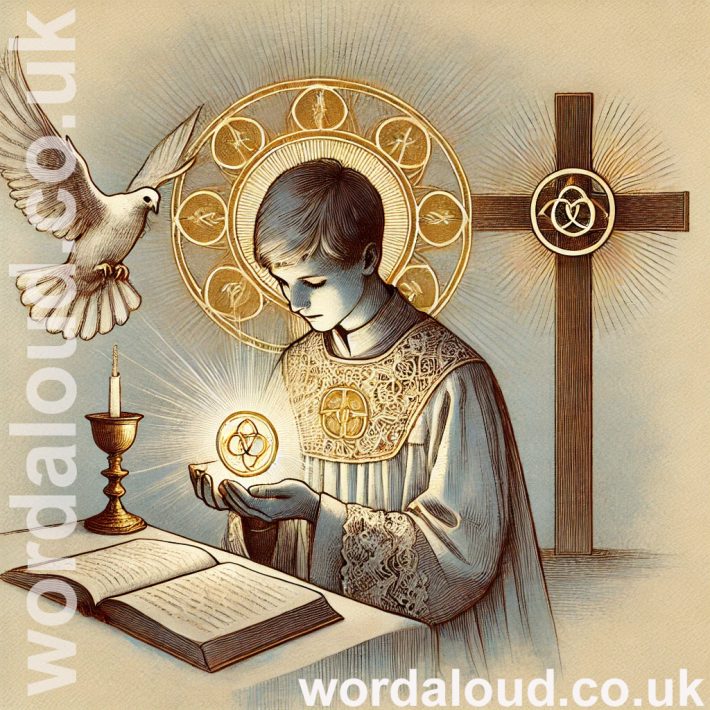Office Of Readings | Eastertide Week 4, Friday | A Reading From The Letter Of Pope Saint Clement I To The Corinthians | Jesus Is The Way
‘Many paths – Jesus is the Way.’
Historical And Ecclesial Context
The First Letter of Clement is one of the earliest post-New Testament Christian writings, dating to around 95 A.D. Clement was the third successor of Saint Peter as Bishop of Rome, and his letter was written to address a crisis in the Corinthian church, where a group of younger Christians had ousted their elders from leadership. Clement’s primary aim was to restore harmony and proper ecclesial order. Against this background, his call for unity, humility, and order takes on profound urgency.
In this passage, Clement urges the Corinthians to live as a united body in Christ, not in disorder or pride. His use of images like the ordered ranks of soldiers and the human body emphasizes that Christian community is not anarchic but structured, with each member playing a role according to the gifts bestowed by God.
Christ As High Priest And Light Of God
Clement opens by focusing our attention on Jesus Christ as the High Priest, drawing a clear link to the Epistle to the Hebrews, where Christ is presented as the perfect intercessor and mediator (Hebrews 4:14–16). Christ is described as the one ‘by whom we look up to the heights of heaven’, the one who reflects God’s glory and who heals our blindness and ignorance.
Clement’s language—’the radiant light of God’s glory’—echoes Hebrews 1:3, reinforcing the doctrine of Christ’s divinity and his function as the revealer of God. It is ‘by him’ that we are brought into the light, enabled to see, and made sharers in immortal knowledge. This Christological emphasis affirms that the Church’s unity and health derive not from human cleverness but from divine grace mediated through Christ.
Discipline, Obedience, And Ecclesial Order
Clement’s reference to the obedience of soldiers serves as a metaphor for ecclesial discipline. He is not promoting authoritarianism but a harmonious ordering of the body of Christ. By comparing Church life to military hierarchy and the human body, Clement articulates a principle echoed by St Paul: ‘If one part suffers, every part suffers with it’ (1 Corinthians 12:26).
Each role in the Church, whether high or low, contributes to the good of the whole. Clement emphasizes mutual dependence: ‘The head is nothing without the feet.’ This undermines any pride of place and reminds all believers—whether leaders or the least regarded—that their dignity lies in their participation in the Body of Christ.
Christian Mutuality And Giftedness
The letter transitions into a call for mutual support and the right use of spiritual gifts. Each Christian is to act according to the ‘special gift bestowed upon him’. This reflects early Christian teachings on charismata—spiritual gifts not earned, but given for the good of the Church (cf. Romans 12:4–8).
- The rich must support the poor.
- The wise must demonstrate wisdom in deeds, not merely words.
- The pure must not boast of their chastity, recognizing it as a gift.
In this, Clement emphasizes humility. No one may exalt themselves or belittle others. All gifts are from God, and so boasting is excluded (cf. 1 Corinthians 4:7). The moral order Clement lays out is one grounded in gratitude, not self-glory.
Anthropology And Gratitude
Clement reminds his readers of their creatureliness: ‘Let us consider how we came into this world… from utter darkness.’ This sober reflection mirrors Psalm 139 and Ecclesiastes, as well as early Christian baptismal imagery. The Christian is someone who has been brought out of death and darkness into life and light.
This theological anthropology grounds Clement’s call to gratitude: all we are and have is from God. Our response must be thanksgiving—Eucharistia—a key word for Christian life. The letter ends with a doxological phrase: ‘To him be glory forever and ever. Amen.’ This is not a mere liturgical formula, but a call to orient the whole of life toward God.
Unity In Christ And Eucharistic Implications
Though not explicitly about the Eucharist, Clement’s emphasis on unity, mutual care, and the body recalls eucharistic ecclesiology—the understanding that the Eucharist makes the Church. Christ, as High Priest, offers the perfect sacrifice, and we as his body must live in sacrificial love, humility, and thanksgiving. The vision here is of a Church that reflects the sacrament it celebrates: one body, many members, united in Christ.
Relevance Today In Christian Faith
In an age often marked by fragmentation—within the Church and society—Clement’s call to mutual respect, ordered harmony, and divine-centred gratitude speaks prophetically. His teaching reminds us that:
- Unity is not uniformity, but a divinely ordered diversity.
- All gifts are to be received with humility and offered for the common good.
- Christ remains the source of all light, knowledge, and true order.

A Reading From The Letter Of Pope Saint Clement I To The Corinthians | Jesus Is The Way
My dear friends, this is the way in which we find our Saviour Jesus Christ, the High Priest of all our offerings, the defender and helper of our infirmity.
By him we look up to the heights of heaven. In his face, exalted and without blemish, we see ourselves reflected. By him the eyes of our hearts are opened. By him our foolish and darkened understanding blossoms up anew towards his marvellous light. By him the Lord has willed that we should taste of immortal knowledge. He is the radiant light of God’s glory. He is now as far above the angels as the title which he has inherited is higher than their own name.
Let us then, men and brethren, with all energy act the part of soldiers, in accordance with his holy commandments.
Think of the soldiers who serve under our generals, and with what order, obedience, and submissiveness they perform the things which are commanded them. Not all are prefects, nor commanders of a thousand, nor of a hundred, nor of fifty, nor the like, but each one in his own rank performs the things commanded by the king and the generals. The great cannot subsist without the small, nor the small without the great. There is a kind of mixture in all things, and thence arises mutual advantage.
Let us take our body for an example. The head is nothing without the feet, and the feet are nothing without the head. The very smallest members of our body are necessary and useful to the whole body. All work harmoniously together and they are under one common rule for the preservation of the whole body.
In Christ Jesus let our whole body be preserved intact. Let every one of us be subject to his neighbour, according to the special gift bestowed upon him.
Let the strong not despise the weak, and let the weak show respect to the strong. Let the rich man provide for the wants of the poor; and let the poor man bless God, because he has given him one by whom his need may be supplied. Let the wise man display his wisdom, not by mere words, but through good deeds. Let the humble not bear testimony to himself, but leave witness to be borne to him by another. Let him that is pure in the flesh not grow proud of it, and boast, knowing that it was another who bestowed on him the gift of continence.
Let us consider, then, brethren, of what matter we were made. Let us consider how we came into this world, as it were out of a sepulchre, and from utter darkness: who and what manner of beings we were. He who made us and fashioned us, having prepared his bountiful gifts for us before we were born, introduced us into his world.
Since, therefore, we receive all these things from him, we ought for everything to give him thanks; to whom be glory forever and ever. Amen.
Glossary Of Terms
Clement of Rome: One of the earliest bishops of Rome (circa 88–99 A.D.), traditionally considered the fourth pope. Author of the First Letter to the Corinthians, written to resolve a leadership dispute in the Corinthian church.
Ecclesial: Relating to the Church. ‘Ecclesial order’ refers to the structure and governance of the Christian community.
High Priest: A title used in the Letter to the Hebrews for Jesus Christ, who offers himself as the perfect sacrifice and mediates between humanity and God.
Epistle to the Hebrews: A New Testament letter that presents Jesus as the fulfillment of Old Testament priesthood and sacrifices.
Radiant light of God’s glory: A phrase from Hebrews 1:3, indicating that Jesus reveals God’s divine nature perfectly.
Charismata: Greek for ‘gifts of grace’; spiritual gifts bestowed by the Holy Spirit for the building up of the Church.
Doxology: A short hymn or phrase of praise to God, often ending prayers or liturgical texts (e.g., ‘to him be glory forever and ever’).
Eucharistia (Εὐχαριστία): Greek for ‘thanksgiving’; refers both to the attitude of gratitude and to the Christian sacrament of the Eucharist.
Ecclesiology: The theological study of the nature and structure of the Church.
Eucharistic ecclesiology: The understanding that the Eucharist is central to the Church’s identity, unity, and mission.
Anthropology (Theological): The study of humanity in light of God’s revelation—what it means to be human, created, fallen, and redeemed.
Unity in diversity: A Christian principle emphasizing that while believers have different gifts and roles, they are united in one body under Christ.
Patristic: Related to the Church Fathers—early Christian theologians and writers who shaped the doctrine and practice of the Church.
Order and harmony: A theme in both natural and ecclesial life, highlighting that each part contributes to the good of the whole under divine design.







